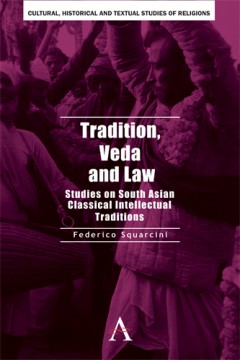Tradition, Veda and Law
Studies on South Asian Classical Intellectual Traditions
By Federico Squarcini
Cultural, Historical and Textual Studies of South Asian Religions
Other Formats Available:
E-Book- About This Book
- Reviews
- Author Information
- Series
- Table of Contents
- Links
- Podcasts
About This Book
The essays presented in this volume constitute a progression from general considerations related to the ‘etic’ (in the geertzian sense of the word) approach to South Asian cultural productions, to peculiar and detailed investigations of them. Such a sequence is meant to develop a renovated and systemic approach, through which these specific cultural materials should be interpreted: materials not to be read in isolation, nor with an overemphasised concern for cultural relativity. Rather, they should be viewed as meaningful examples of sophisticated intellectual and cultural procedures to be included into a broader comparative discussion, also in order to increase the quality and the depth of such debate. The studies gathered in this volume are therefore arranged to fit specific South Asian materials into larger analytical frameworks.
Reviews
‘[T]hese contributions give us an excellent series of conceptual case studies of how to do more with normative texts than affirm or deny their applicability or reality. By reaching out to contemporary theoretical work, Squarcini shows how perennial topics of ideology-formation, the politics of contested language, and the non-physical effects of punishment may be studied through the lens of even ancient Sanskrit intellectual traditions.’ —Donald R. Davis, ‘Journal of Hindu Studies’
Author Information
Federico Squarcini is Associate Professor in the Department of History at the University of Florence, where he teaches the history of Indian religions.
Series
Cultural, Historical and Textual Studies of South Asian Religions
Anthem South Asian Studies
Table of Contents
I. Understanding South Asian Cultural Production. In Search for a New Historical and Hermeneutic Awareness; II . ‘Pasadin’, ‘vaitandika’, ‘vaitaṇḍika’ and ‘nastika’. On Criticism, Dissenters and Polemics and the South Asian Struggle for the Semiotic Primacy of Veridiction; II. Being Good is Being ‘vaidika’. On the Genesis of a Normative Criterion in the ‘Manavadharmasastra’; IV. ‘na mlecchabhasam sikseta’. On the Authority of Speech and the Modes of Social Distinction through the Medium of Language; V. Punishing in Public. Imposing Moral Self-Dominance in Juridical Sanskrit Sources
Links
Stay Updated
Information
Latest Tweets



